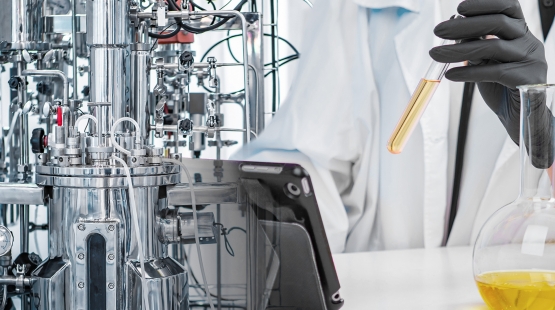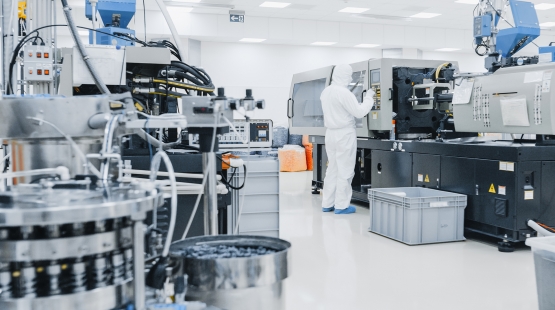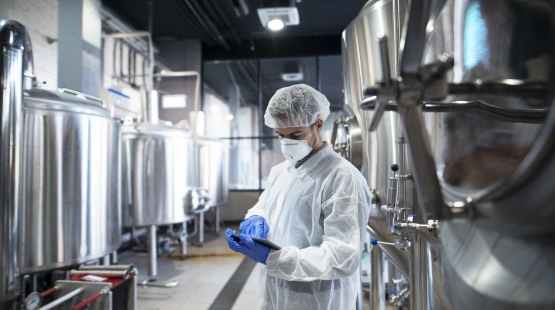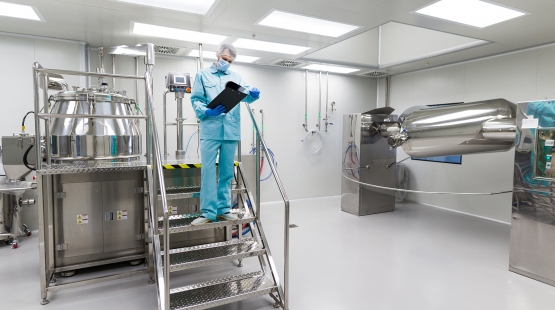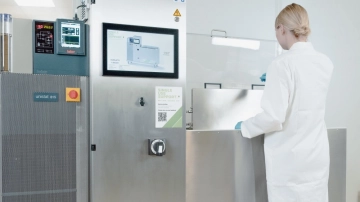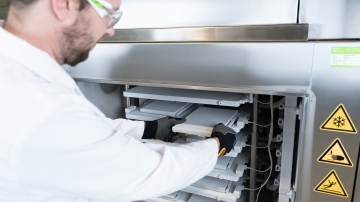Filling & Freezing large volumes for fermentation in less than 8 hours
Table of contents
ShowMicrobial and bacterial fermentation is of great importance in the production of biologics, especially for the manufacturing of small molecules. The filling and freezing of large volumes for fermentation is an essential part during different production steps in upstream and downstream processing.
During the process different challenges have to be faced to ensure quality, cost and time management are as effective as possible.
In the following, we will explain why it is important to act fast and how an optimization of the process can be achieved.
Why is fast processing in the fermentation of pharmaceutical compounds important?
An effective supply chain depends on speed as well as accuracy. In order to guarantee a product that is safe for patient’s use, it has to be protected from contamination risks during manufacturing and transport.
Time is an important factor in the handling of sensitive pharmaceutical compounds. To prevent product loss, quick filling of the drug substance and freezing to -80 Celsius are necessary to guarantee the integrity of a drug product.
Pharmaceutical fermentation can easily involve high-volume processing up to batch sizes of 1000 liters per day. Fast processing is necessary in order not to leave the ferments non-frozen and suffer a loss of quality.
In the absence of alternatives spray drying is widely used in microbial fermentation manufacturing. However, drying comes with major disadvantages that do not occur with fast controlled freezing.
Challenges and disadvantages of spray drying in microbial fermentation manufacturing include:
- Loosing product activity
- Scalability to large-scale freezing
- Spray drying is not aseptic
- Bioburden management, since spray drying is an open system
- Long lead times
Since maintaining ferments in liquid form is more controllable. This is where advanced single-use technologies and the advantages of plate-freezing come into play.
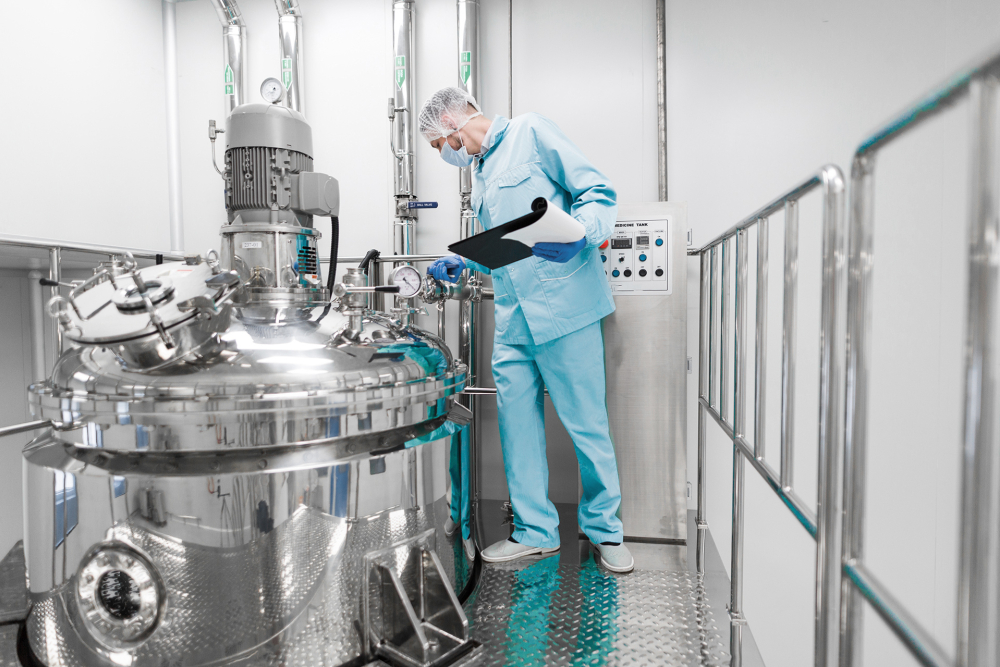
How to freeze hundreds of liters in less than 8 hours?
There are three ways to freeze large volumes, although only one method can be the best in terms of quality.
Freezing technologies for large volumes:
- Blast freezer
- Cryovessel
- Plate freezer
For a long time large stainless steel vessels have been the state-of-the-art when freezing active pharmaceutical ingredients, including microbial fermenation. A weak point with large volume containers is that freezing takes a long time and flexible scaling is difficult and therefore inefficient.
While with cryovessel only freezing down to -50°C is possible, blast freezing enables lower temperatures. However, with blast freezing there is a high prevalence of cryoconcentration.
Plate-based freezing enables fast and controlled freezing without the risk of cryoconcentration down to -80°C. The direct contact of the freezing plates to the primary and secondary packaging guarantees homogeneous freezing and ensures high product quality.
With single-use technologies it is possible to aliquote drug substances into smaller portions in single-use bags before they are rapidly frozen in a plate-based freeze-thaw platform system.1
Fast filling for fermentation
The process of bacterial and microbial fermentation is prone to the risk of viral contamination. Current good manufacturing practices (cGMP) define product quality process control and product safety as key elements in the process to guarantee a safe product. This means the filling process has to be sterile and product loss through residual volume or spilling has to be avoided.
With innovative automated single-use technologies, sterile filling is possible with up to 300 liters in less than one hour. Especially large-scale projects profit from the fully automated and highly efficient filling method. However, through flexible scalability due to single-use bags, smaller amounts can be handled with the same precision. Find out more about fast automated filling with a single-use bag aseptic filling machine.
Controlled freezing for fermentation
The freezing of biologicals is necessary, if you do not want to rely on spray drying or lyophilization. But freezing can also impose stress on the formulation. Especially fragile protein structures are easily affected by uncontrolled freezing methods because it can cause unwanted alterations in the product. Risks to avoid during freezing are the forming of a protein aggregation which can occur when temperature is distributed slowly and not uniform in a single-use bag as well as cryoconcentration.
As of new, there are advanced freezing technologies that have been developed for a controlled freezing process for pharmaceutical fermentation. Plate freezing systems allow for uniform and fast freezing. Crystallization can be distributed homogeneously throughout the single-use bag, promoting the uniform ice front growth speed and protecting solubles from denaturation.
Plate freezers for large volume from Single Use Support
Single Use Support offers a plate-based freezer for batch sizes up to 500 liters. Individual 50 liter single-use bags are automatically filled in a rack. After filling, the rack is transported to the plate freezer by a forklift. The freezing plates are already integrated in the rack, so there is no need to move the shells around the single-use bags. After the freezing process, the rack is removed again by the forklift.
Up to 500 liters batch volumes, divided into 50 liter bags, can be frozen to -80°C in the RoSS.pFTU XL, but also into RoSS.pFTU Large Scale platform.
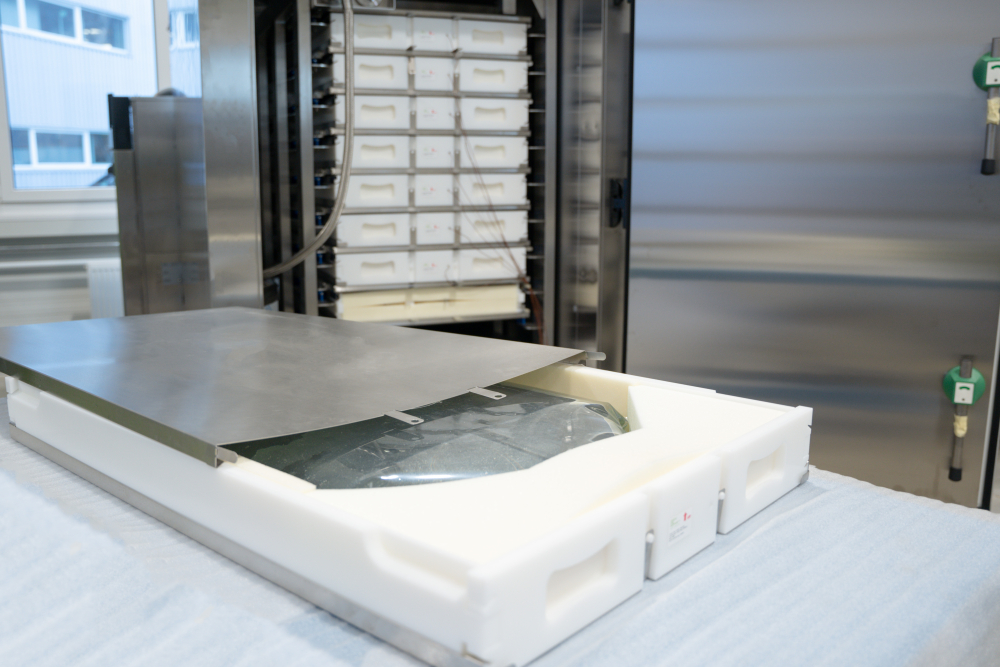
Pharmaceutical fermentation processes are often time-consuming and involve a lot of risks due to the sensitivity of the products. To help you overcome those issues automated end-to-end solutions for all scales by Single-Use Support help to minimize the risk of contamination through human borne microbes.
While the coordinated processes are cGMP compliant, flexible in their scalability and more efficient, they also save time and therefore reduce unnecessary costs.
Single Use Support is a reliable partner until commissioning of systems and beyond. When it comes to outsourcing project steps, our technology is compatible with all other types of single-use assemblies, bags, and other manufacturing products, to make the experience as flexible as possible for you.
Customized solutions based on single-use technology
Pharmaceutical fermentation processes are often time-consuming and involve a lot of risks due to the sensitivity of the products. To help you overcome those issues automated end-to-end solutions for all scales by Single-Use Support help to minimize the risk of contamination through human borne microbes.
While the coordinated processes are cGMP compliant, flexible in their scalability and more efficient, they also save time and therefore reduce unnecessary costs.
Single Use Support is a reliable partner until commissioning of systems and beyond. When it comes to outsourcing project steps, our technology is compatible with all other types of single-use assemblies, bags, and other manufacturing products, to make the experience as flexible as possible for you.
More about pharmaceutical fermentation
- Large-Scale Freezing of Biologics: Understanding Protein and Solute Concentration Changes in a Cryovessel—Part 2, https://www.biopharminternational.com/view/large-scale-freezing-biologics-understanding-protein-and-solute-concentration-changes-cryovessel-p-0, Published 01.07.2010




